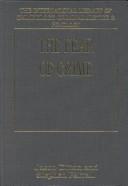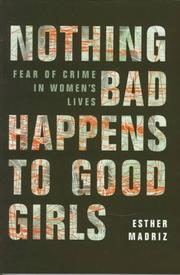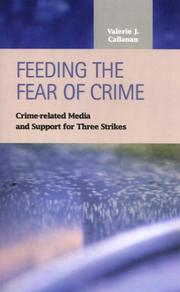| Listing 1 - 10 of 17 | << page >> |
Sort by
|

ISBN: 1351544624 1315086611 1351544632 9781351544634 9781351544627 9781840140637 Year: 2016 Publisher: London
Abstract | Keywords | Export | Availability | Bookmark
 Loading...
Loading...Choose an application
- Reference Manager
- EndNote
- RefWorks (Direct export to RefWorks)
"Studies of the fear of crime have constituted what is undeniably the fastest growing research area within criminology in the last decade and this shows no sign of diminishing. The editors have a distinguished record of innovative research in the field, being responsible for a number of seminal empirical and theoretical articles. In this volume, they have collected together and for the first time, all the most significant contributions to the field. The collection includes an introductory essay by the editors and articles reflecting: an overview of the field; the causes of vulnerability; the sources of information on victimisation; the methods used to survey fear; the theoretical models employed to explain it; and the nature of policies designed to reduce fear."--Provided by publisher.
Fear of crime. --- Victims of crimes. --- Victims of crimes surveys.
Book
ISBN: 3030982904 3030982890 Year: 2022 Publisher: Cham Springer Nature
Abstract | Keywords | Export | Availability | Bookmark
 Loading...
Loading...Choose an application
- Reference Manager
- EndNote
- RefWorks (Direct export to RefWorks)
Criminology has until recently neglected the nature and levels of crime outside the urban realm. This is not a surprise as crime tends to concentrate in urban areas and the police directs resources where the problems are. Yet, there are many reasons why scholars, decision-makers and society as a whole should care about crime and safety in rural areas. This book highlights 20 reasons why crime and safety in rural areas is a topic of relevance. We attempt to untangle currently simplistic views of the rural by discussing a number of facets of the countryside as both safe and criminogenic, and more importantly, a hybrid place worth to be examined in its own right. We adopt the notion of a rural-urban continuum that captures the nuances of places of varied nature, spanning from remote and desolate spaces to accessible and connected environments of the urban fringe. Areas on the rural-urban continuum may be in constant transformation given local and global influences, which imposes challenges for policing and long-term social sustainability. Then, the book critically reviews a rich body of English-language literature in rural criminology that extends over more than four decades—a scholarship that has engaged researchers and practitioners in all continents. The books finishes with a discussion of the emergent research questions of the field, and offers implications for practice and the 2030 Sustainable Development Goals.
Crime & criminology --- rural crime --- fear of crime in the rural --- situational crime prevention --- policing --- sustainibility
Book
ISBN: 9782753534544 2753534543 2753559902 Year: 2014 Publisher: Rennes: Presses universitaires de Rennes,
Abstract | Keywords | Export | Availability | Bookmark
 Loading...
Loading...Choose an application
- Reference Manager
- EndNote
- RefWorks (Direct export to RefWorks)
Les « insécurités urbaines », les formes prises à l’époque contemporaine par les conflits militaires et leurs avatars dans les centres urbains, constituent des thématiques de recherche fortement investies par les sciences sociales depuis quelques années. L’abondance des productions scientifiques ne conduit pas toujours à questionner, à comparer les regards déployés et les méthodes mises en oeuvre pour analyser les facteurs et les situations qui mettent en crise les sociétés urbaines, ou les solutions et les dispositifs qui prétendent y remédier. Cet ouvrage, issu d’un ensemble de rencontres pluridisciplinaires, s’efforce de prendre du recul par rapport aux façons de voir et aux façons de faire de différentes disciplines des sciences sociales qui investissent ce champ d’étude des « insécurités » et des « crises ». Il entend aider à confronter les analyses, les méthodes et les terrains d’enquêtes de l’histoire, de la géographie, de la sociologie, du droit, des sciences politiques et – même – du cinéma documentaire – pour appréhender les moments où les villes entrent « en ébullition » du fait des tensions qui perturbent leur vie sociale ou de leur désordre matériel devenu « explosif ». En abordant successivement « l’effervescence insécuritaire », « la ville déchirée » des temps de guerres – y compris coloniales et civiles – et, enfin, les moyens servant à « apaiser et à discipliner » les villes, ce livre veut réfléchir à des objets, à des pratiques concrètes et à des discours, à des formes d’organisations sociales et politiques, à des idéologies et à des formes de justification/légitimation qui se déploient dans le temps et dans l’espace. À travers ces contributions, on reconnaîtra l’usage et les réflexions inspirées par les travaux de Michel Foucault, ici moins « maître à penser » que pourvoyeur d’une féconde « boîte à outils ». Il convient de les lire de manière ouverte, comme autant de propositions pour aller plus loin dans le dialogue et la réflexion, cela dans…
Sociology, Urban. --- City and town life. --- Urban violence. --- Fear of crime. --- Sociologie urbaine --- Vie urbaine --- Violence urbaine --- Peur du crime --- Sécurité urbaine. --- Conflits sociaux. --- Violence urbaine. --- Sécurité urbaine --- History --- sociologie urbaine --- conflit --- violence --- ville
Book
ISBN: 1441956468 1299197000 1441956476 Year: 2012 Publisher: New York : Springer,
Abstract | Keywords | Export | Availability | Bookmark
 Loading...
Loading...Choose an application
- Reference Manager
- EndNote
- RefWorks (Direct export to RefWorks)
The impact of crime on society is well-known and well-documented. But fear of crime also takes a major toll, affecting individual mobility, neighborhood cohesion, and local economies, and is an increasingly important topic in criminology and other disciplines. In recent years, Geographic Information Systems technology has brought needed spatial dimensions to research into fear of crime. Putting Fear of Crime on the Map reviews these efforts, chronicling the evolution of both research and technology. Fear of crime is defined as a complex system of avoidance behaviors that paradoxically helps create conditions favorable to crime, and the authors summarize approaches used in understanding the problem. In later chapters, data from two landmark studies examine new ways of conceptualizing and addressing fear of crime offered by GIS technology, and the authors present innovative GIS-based methods for reducing fear of crime, as well as in monitoring the effectiveness of law enforcement and community initiatives. Key features of the book: · Historical and current trends in fear of crime research. · Analysis of fear of crime is a serious analytical and social problem. · Social/environmental theories explaining fear of crime. · Technical breakdown of Geographic Information Systems techniques used to map fear of crime. · Findings from eight years of studies of fear of crime using GIS technology. · Potential applications for fear mapping, and emerging areas for fear of crime research. Putting Fear of Crime on the Map is a unique source of information for graduate and postgraduate researchers in criminology, and policy makers.
Fear of crime -- Geographic information systems. --- Fear of crime --- Social Welfare & Social Work --- Social Sciences --- Criminology, Penology & Juvenile Delinquency --- Geographic information systems --- Geographic information systems. --- Geographical information systems --- GIS (Information systems) --- Human geography. --- Psychology. --- Criminology and Criminal Justice. --- Criminology and Criminal Justice, general. --- Human Geography. --- Psychology, general. --- Information storage and retrieval systems --- Crime --- Geography --- Criminology. --- Philosophy (General). --- Anthropo-geography --- Anthropogeography --- Geographical distribution of humans --- Social geography --- Anthropology --- Human ecology --- Social sciences --- Criminals --- Study and teaching --- Behavioral sciences --- Mental philosophy --- Mind --- Science, Mental --- Human biology --- Philosophy --- Soul --- Mental health

ISBN: 0520918967 0585047685 9780520918962 9780585047683 0520202910 0520208552 Year: 1997 Publisher: Berkeley University of California Press
Abstract | Keywords | Export | Availability | Bookmark
 Loading...
Loading...Choose an application
- Reference Manager
- EndNote
- RefWorks (Direct export to RefWorks)
"The possibility of being a victim of a crime is ever present on my mind; thinking about it as natural as breathing."--40-year-old woman This is a compelling analysis of how women in the United States perceive the threat of crime in their everyday lives and how that perception controls their behavior. Esther Madriz draws on focus groups and in-depth interviews to show the damage that fear can wreak on women of different ages and socioeconomic backgrounds. Although anxiety about crime affects virtually every woman, Madriz shows that race and class position play a role in a woman's sense of vulnerability. Fear of crime has resulted in public demand for stronger and more repressive policies throughout the country. As funds for social programs are cut, Madriz points out, those for more prisons and police are on the increase. She also illustrates how media images of victims--"good" victims aren't culpable, "bad" victims invite trouble--and a tough political stance toward criminals are linked to a general climate of economic uncertainty and conservatism. Madriz argues that fear itself is a strong element in keeping women in subservient and self-limiting social positions. "Policing" themselves, they construct a restricted world that leads to positions of even greater subordination: Being a woman means being vulnerable. Considering the enormous attention given to crime today, including victims' rights and use of public funds, Madriz's informative study is especially timely.
Women --- Fear of crime --- Social Welfare & Social Work --- Social Sciences --- Criminology, Penology & Juvenile Delinquency --- Crime --- Crimes against --- Psychology --- Attitudes --- Psychology. --- Attitudes. --- abuse. --- anxiety. --- bad victims. --- conservative politics. --- crime. --- criminal justice. --- criminology. --- culpability. --- danger. --- fear of crime. --- fear. --- female victims. --- feminism. --- feminist theory. --- gender hierarchy. --- gender studies. --- gender. --- good victims. --- law and order. --- legal system. --- media. --- nonfiction. --- patriarchy. --- potential victim. --- poverty. --- risk management. --- social justice. --- social programs. --- social science. --- subservience. --- threat perception. --- threat. --- victims rights. --- victims. --- violence against women. --- vulnerability. --- women. --- womens issues. --- womens studies.
Book
ISBN: 9782015571 282181965X 9791092312065 Year: 1997 Publisher: IFRA-Nigeria
Abstract | Keywords | Export | Availability | Bookmark
 Loading...
Loading...Choose an application
- Reference Manager
- EndNote
- RefWorks (Direct export to RefWorks)
Crime prevention and architectural design --- Fear of crime --- Crime prevention --- Burglary protection --- Violence --- Social Welfare & Social Work --- Social Sciences --- Criminology, Penology & Juvenile Delinquency --- Violent behavior --- Building security --- Burglary --- Housing security --- Protection against burglary --- Residential security --- Crime --- Prevention of crime --- Prevention --- Government policy --- Social psychology --- Public safety --- Architectural design --- cambriolage --- violence urbaine --- Lagos --- Urban Design --- Nigeria --- criminalité --- violence

ISBN: 1280361433 9786610361434 1593321619 9781593321611 9781593320621 1593320620 Year: 2005 Publisher: New York (N.Y.) LFB Scholarly
Abstract | Keywords | Export | Availability | Bookmark
 Loading...
Loading...Choose an application
- Reference Manager
- EndNote
- RefWorks (Direct export to RefWorks)
Fear of crime --- Crime --- Criminal justice, Administration of --- Mass media and crime --- Crime and mass media --- Administration of criminal justice --- Justice, Administration of --- Criminal law --- Criminals --- City crime --- Crime and criminals --- Crimes --- Delinquency --- Felonies --- Misdemeanors --- Urban crime --- Social problems --- Criminology --- Transgression (Ethics) --- Public opinion. --- Law and legislation --- Social aspects

ISBN: 1135936404 1138977241 1135936412 1280019409 0203507797 9780203507797 0415947871 9781138977242 9781135936419 9781280019401 9781135936365 9781135936402 9780415947879 Year: 2004 Publisher: New York Routledge
Abstract | Keywords | Export | Availability | Bookmark
 Loading...
Loading...Choose an application
- Reference Manager
- EndNote
- RefWorks (Direct export to RefWorks)
This volume examines both 'old media' treatment of crime legends: news reports, fictional film and television depictions, as well as 'new media' interactive discussions of them: versions and discussions circulating in Internet newsgroups and via electronic mail lists.
Crime in popular culture --- Crime --- Urban folklore --- Fear of crime --- Cities and towns (in religion, folklore, etc.) --- City and town life --- City folklore --- Urban legends --- Urban lore --- Folklore --- City crime --- Crime and criminals --- Crimes --- Delinquency --- Felonies --- Misdemeanors --- Urban crime --- Social problems --- Criminal justice, Administration of --- Criminal law --- Criminals --- Criminology --- Transgression (Ethics) --- Popular culture --- Electronic discussion groups --- Social aspects --- Folklore and the Internet
Book
ISBN: 1479849456 1479864366 Year: 2020 Publisher: New York : New York University Press,
Abstract | Keywords | Export | Availability | Bookmark
 Loading...
Loading...Choose an application
- Reference Manager
- EndNote
- RefWorks (Direct export to RefWorks)
"From moral panics about immigration and gun control to anxiety about terrorism and natural disasters, Americans live in a culture of fear. While fear is typically discussed in emotional or poetic terms--as the opposite of courage, or as an obstacle to be overcome--it nevertheless has very real consequences in everyday life. Persistent fear negatively effects individuals' decision-making abilities and causes anxiety, depression, and poor physical health. Further, fear harms communities and society by corroding social trust and civic engagement. Yet politicians often effectively leverage fears to garner votes and companies routinely market unnecessary products that promise protection from imagined or exaggerated harms. Drawing on five years of data from the Chapman Survey of American Fears--which canvasses a random, national sample of adults about a broad range of fears--Fear Itself offers new insights into what people are afraid of and how fear affects their lives. The authors also draw on participant observation with Doomsday preppers and conspiracy theorists to provide fascinating narratives about subcultures of fear. Fear Itself is a novel, wide-ranging study of the social consequences of fear, ultimately suggesting that there is good reason to be afraid of fear itself."--
Fear --- United States. --- United States --- Politics and government --- Social conditions --- american media. --- anxiety. --- behavior. --- chapman survey of american fears. --- conspiracy theory. --- danger control. --- doomsday. --- emotional responses. --- fear control. --- fear of crime. --- fearful. --- frightened. --- immigration. --- islamophobia. --- pandemic. --- psychology of fear. --- risk. --- threat.
Book
ISBN: 3319892967 3319892975 Year: 2018 Publisher: Springer Nature
Abstract | Keywords | Export | Availability | Bookmark
 Loading...
Loading...Choose an application
- Reference Manager
- EndNote
- RefWorks (Direct export to RefWorks)
This book is open access under a CC BY 4.0 license.
Police. --- Criminology and Criminal Justice. --- Policing. --- Science and Technology Studies. --- Cops --- Gendarmes --- Law enforcement officers --- Officers, Law enforcement --- Officers, Police --- Police forces --- Police --- Police officers --- Police service --- Policemen --- Policing --- Criminal justice, Administration of --- Criminal justice personnel --- Peace officers --- Public safety --- Security systems --- Legal status, laws, etc. --- Technology --- Sociological aspects. --- Technology—Sociological aspects. --- Sociology of technology --- Sociology --- Crime Detection --- Police Science --- Technology and Ethics --- Community-Oriented Policing --- Police Legitimacy --- Police-Community Relations --- Fear of Crime --- Policing and Society
| Listing 1 - 10 of 17 | << page >> |
Sort by
|

 Search
Search Feedback
Feedback About UniCat
About UniCat  Help
Help News
News